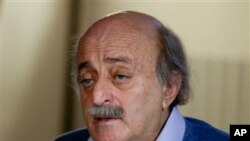Lebanon's political waters remained murky over the weekend, ahead of expected parliamentary consultations Monday on a new prime minister. The big question on everyone's minds is whether Druse leader Walid Jumblatt will be able to deliver the Hezbollah-led opposition enough of his parliament deputies to give them the majority necessary to crown their candidate prime minister.
On Friday, Walid Jumblatt said his party stands with Syria and the resistance, a direct reference to Hezbollah. But he stopped short of saying that he would deliver his 11 members of parliament to the opposition. Lebanese newspapers reported Saturday that Jumblatt met late Friday with the head of Hezbollah Hassan Nasrallah.
Most Lebanese suspect the political horse-trading will continue until the moment the parliamentary consultations begin - whether that is as scheduled on Monday or if they are postponed for a second time.
If the opposition - known as the March 8th bloc - acquires the roughly 65 deputies needed for a majority in the 128-member parliament, then they are likely to back former Prime Minister Omar Karami as their candidate.
Karami has held the office before, most notably in 2005 when his predecessor Rafiq Hariri was killed in a massive truck bombing. Karami's pro-Syrian government came under huge public pressure following the assassination, which many Lebanese blamed on Damascus, precipitating Karami's resignation a couple of weeks later.
If the Western-backed parliament bloc, known as the March 14th coalition, hangs on to their slim majority, they will re-nominate the slain Hariri's son, Saad, as prime minister. Saad Hariri was toppled from the job 10 days ago, when opposition ministers resigned from the cabinet forcing his government's collapse.
Whether on the Lebanese street or among analysts, everyone is discussing Walid Jumblatt and which way his deputies will vote.
Ahmed, a taxi driver in West Beirut says Jumblatt will only be able to offer himself and two of his deputies.
While Mitri, a hairdresser in East Beirut thinks Jumblatt might deliver more.
"I think so, Walid Jumblatt have only five persons," said Mitri.
Samir works in a Beirut hotel. He says he thinks Jumblatt will deliver all eleven of the deputies in his bloc to the opposition.
"Well a hundred percent I guess this time," said Samir. "… Jumblatt is very smart. He just wants to be in the safe way. No matter [if] it gets worse, he just wants to be safe."
Analysts are also weighing in. Michael Young is the Opinion Editor for the English-language newspaper The Daily Star.
"I think while the numbers are not precise, I think six or seven of his MPs will vote with Omar Karami for prime minister," said Young. "He will not be able to bring all his bloc over perhaps to back Karami, but he I think he will bring enough to ensure that Karami wins."
Lebanese American University Political Science Professor Imad Salamey agrees.
"So far it's being said that actually Jumblatt will sway seven votes not in favor of Hariri, however, the Hezbollah will nominate," said Salamey. "So it seems that the prime minister-to-be will be winning nomination on one or two votes, that is about it. Very close call."
Until very recently, Jumblatt supported the premiership of Saad Hariri. Michael Young thinks his recent switch was done under pressure.
"I think he had absolutely no choice," added Young. "I don't think he would consider it a good move. I don't think Jumblatt wanted to get rid of Hariri. Last week he made it clear that he would back Hariri. But in a week he was basically threatened it seems, and he had to go along with the candidate of the opposition of Hezbollah, and it seems at least from now that it will be Omar Karami."
Asked if consultations would go ahead Monday, LAU Professor Imad Salamey said he does not think they will be postponed for further negotiations, because he believes Hezbollah and Syria want to move ahead.
"They seem very determined to switch political directions in Lebanon in favor of their camp, particularly March 8," noted Salamey. "They seem also determined to marginalize Hariri and his group. Now the extent to which they can succeed in this is still a matter to be seen."
If Jumblatt plays kingmaker on Monday and the Hezbollah-led opposition candidate succeeds the analysts say Lebanon could be entering a very dark period. They warn that a Hezbollah-led government will isolate the country from the United States and European Union, as well as Sunni Arab governments in the region, having both economic and political repercussions in Lebanon.




